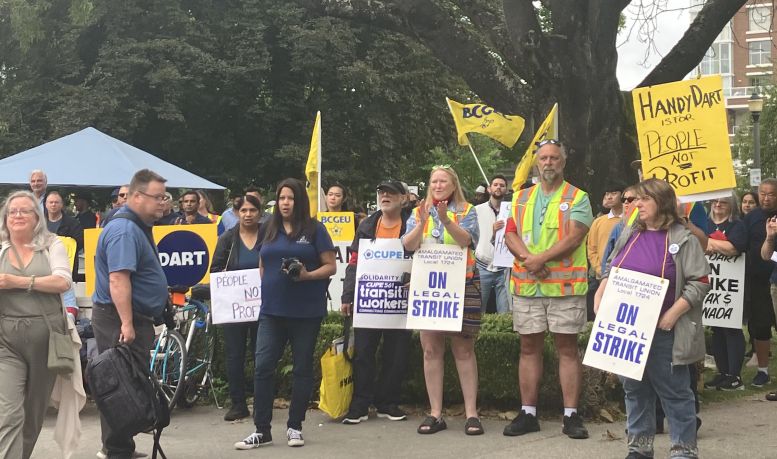Update
After 20 days on strike the HandyDART workers ratified a new contract.
Over 600 workers at HandyDART in Metro Vancouver started strike action on September 3. HandyDART workers provide a vital public service, moving people with mobility issues door-to-door. They take people to and from medical appointments, for social trips and many other vital journeys. Health workers consider them part of the health system, a necessary part of keeping people healthy.
After 11 months of fruitless negotiations, the members of the Amalgamated Transit Union Local 1724 had had enough. At the end of June, they voted by 95 percent for strike action, while agreeing to continue to provide journeys for urgent health visits.
The company put forward a poor offer that was rejected by 83 percent of the members. The workers earn significantly less than other transit workers in the region.
Privatized Public Service
HandyDART is a public service, paid for in part from public revenues. Yet it is delivered by a private, for-profit company. It was privatized in 2009 and since then the public transit provider, TransLink, has awarded the contract to a revolving door of multinational corporations, who have made millions from this contract. Their profits come from under-paid workers and delivering low quality service.
When the contract was awarded to First Transit in 2017, TransLink’s boss said that its bid was the lowest by a “fairly significant” amount, but claimed there would be no decline in the service quality!
Since 2022, HandyDART has been operated by Transdev, which bought out First Transit and its contract. Transdev is a French multinational corporation with revenue of $14 billion and profits of $900 million in 2023. It has a record of poor industrial relations; nearby Fraser Valley transit workers had to strike for 4 months in 2023 to win a decent contact. It has been fined many times for health, safety, labour and contract violations.
“Love the Drivers – Not the Company”
HandyDART is valued by the people who use it and by the providers of social and health services, as the drivers deliver vulnerable people safely for care. The drivers have a month of training, so they know how to help people, load and unload wheelchairs and treat people with respect.
The workers clearly care about the people who ride with them and take pride in their work. Part of the dispute is about reversing the declining quality of the service they provide.
While the dispute will cause riders inconvenience in the short-term, many users recognise that the workers are poorly paid and that the company is putting profits before the riders. Beth McKellar, chair of the HandyDART Riders’ Alliance, said “Hang in there, folks, it’s short-term pain for long-term gain.”
Beth summed up the view of many saying she loves her bus drivers — but not the way the company is run. And with good reason. The company makes it difficult to deliver a good service, exploiting the workers and the users. The phone lines and the dispatchers are over-stretched; last year alone frustrated users abandoned some 86,500 calls for a lift. Although HandyDART delivered 1,175,900 lifts in 2023, there were over 400,000 requests that were not delivered.
Increasingly, the company relies on taxis to provide rides rather than HandyDART buses. Over the last year, 25 percent of rides were in taxis — TransLink’s target is less than 7 percent. Taxi drivers are not trained to assist people with mobility challenges. Not all taxis have the necessary safety equipment.
Make the Public Service Public
At a mass rally to launch the strike on September 3, hundreds of workers attended as well as a strong contingent from the labour movement, users of HandyDART and the public. Several ATU leaders, from the local, the Canadian office and the international’s head office, all pledged solidarity. Unions representing workers in health and care — Health Sciences (HSA), Hospital Employees (HEU), BC Government workers (BCGEU) and public employees (CUPE) — were strong in their support. There were also speakers from Longshore (ILWU), federal public services (PSAC), and the BC Federation of Labour. Given Transdev’s history of bad labour negotiating, the solidarity of the wider labour movement may be needed to make the company negotiate realistically.
Three federal NDP MPs and two representatives of local government gave clear messages of solidarity. However, the politicians who can make a difference — the provincial NDP —were not there. They are the governing party in BC and the BC government owns TransLink — they could call the shots.
Some of the most moving speeches were from HandyDART users, describing how the drivers make them feel safe and welcome, how they care for the riders and provide quality help.
Almost every speaker demanded that HandyDART was returned to the public sector Stop the profiteering off the drivers and users.




